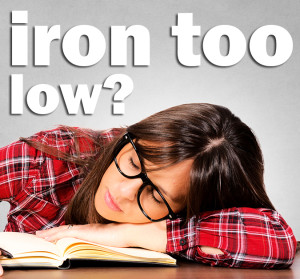Can Iron Deficiency Cause Hair Loss?
What do I do if I suspect low iron is causing my hair loss?
 If you’ve done any research at all about hair loss in women then you probably know that there are a lot of reasons your hair could be thinning. One very common reason is low iron levels. So does iron deficiency cause hair loss?
If you’ve done any research at all about hair loss in women then you probably know that there are a lot of reasons your hair could be thinning. One very common reason is low iron levels. So does iron deficiency cause hair loss?
Iron is an essential mineral for our bodies and is required for a number of different bodily functions, from immunity to the synthesis of DNA and the transmission of nerve signals. Iron is also a major component of haemoglobin, the red blood cells responsible for carrying oxygen around in our blood. Iron is also an essential component of healthy hair.
If low iron is your issue you will probably notice a type of hair loss known as ‘telogen effluvium’ or ‘diffuse hair loss’. This is a condition where more than normal amounts of hair fall out, or shed. The overall appearance is of thin hair and often the first a woman notices of this type of hair loss is the sudden appearance of the scalp showing through.
This type of hair thinning can happen relatively quickly or very slowly over a period of years. Although this is seen in all age groups, it is the most common cause of hair loss in pre-menopausal women.
To find out if your iron levels are low you will need to visit your general practitioner for a blood test. To test for low iron, your doctor will be likely to order a couple of different tests. He will test for serum iron to see just how much iron is circulating around your blood stream, your ferritin levels to gauge the amount of iron stores you have as well as other tests including haemoglobin. These will provide an overall picture of your iron levels as a good starting point.
The reason low iron results in hair loss is that when the body is low in iron it uses less of what it does have on non-essentials such as maintaining and growing hair, but rather concentrates its iron usage on life sustaining essentials such as oxygen supply.
While low serum iron is certainly a factor in hair loss, once iron stores are depleted, the resultant hair loss can be even more devastating. When ferritin stores in the hair follicles decline, the hair that is produced will often be non-pigmented fine hair as well as dry and brittle hair. Because low iron stores further depletes hair volume it then takes much longer for the body to recover. So if you suspect your iron levels are low, then get to your doctor for some tests before your iron stores are affected also.
Because iron is an important element required by the immune system, low iron can also lead to hair loss conditions like alopecia areata, an autoimmune disease.
How will I know if low iron is my problem?
To be sure that you have low iron levels, you will need to visit your GP who will refer you for a blood test, however here are some common symptoms of low iron levels which you may recognise.
- general fatigue
- weakness
- pale skin
- shortness of breath
- dizziness
- strange cravings for non-food items, such as dirt, ice, and clay
- tingling or a crawling feeling in the legs
- swelling or soreness in the tongue
- cold hands and feet
- fast or irregular heartbeat
- brittle nails
- headaches
This is not an exhaustive list, and many of the symptoms listed can be attributed to other things, so see your GP to confirm that you have low iron before taking any supplements as taking iron supplements when they are not needed can be very dangerous.
What can I do about low iron?
Your doctor will give you some recommendations which may include iron supplements and diet changes. The good news is that where hair loss is the result of low iron levels, restoring iron levels will usually cure the hair loss.
It can take up to eighteen months for hair to regrow as iron levels need to be restored first and then the body begins to re-establish its focus on growing healthy hair.
If this is you, then just shake in a concealer like BOOSTnBLEND to make hair appear instantly thicker and healthier while you sit tight and wait for your hair to bounce back.





